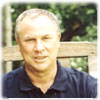Zukunftszeugen III - Robert Wilson
Index Interview
Transcript 1
Transcript 2
Transcript 3
Transcript 4
|
Zukunftszeugen III - Robert Wilson Index Interview Transcript 1 Transcript 2 Transcript 3 Transcript 4 |
|||||
| |

2. Robert Wilson, "Zukunftszeuge" What do you see, when you look at the future? I think that we will rediscover what we are born knowing. Which is always rediscovering the classics. Socrates: It's just the uncovering of the knowledge, that's the learning process. And I believe that. We have to rediscover what has already been known. When we look at the history of man. It's very curious. The man has always been discerning the same patterns in terms of mathematics and geometry. Especially when we look at art, we see that the Chinese, or the Indians from Latin America. When we look at a neck tie by Yves Saint Laurent or at an American Indian blanket - it's very curious that it is often exactly the same geometry in terms of patterns, that man is discerning. But we have to rediscover it. How could this process of rediscovery can be accelerated or be guided? Well, I think, there are very different ways how one can rediscover it. In this center, I try to have it as a free institution, unstructured and part of the way of learning. And than there are these programs, that are highly structured. Because we don't know very much about learning processes and about creativity. But it's true, that some people can learn better through an unstructured program, through an institution, an academy. But I think one of the things that often disturbs me or concerns me, is that most academies that we have for learning are highly structured. That's very good for many people. But for some people it doesn't work. So I think you have got to be able to go both ways. And how does this unstructured program function in detail? Many times we start a project, I have no idea what it's going to be. It could be a film, it could be a book, it could be a building. And it could be how to plant the garden. It could be something concerning ecology. It could be - we don't know. And that's the reason to do it. The reason that I work as an artist, is to ask: What is it? and not to say what something is. And I think too often, academies are always explaining what something is. If you know what it is, then there's no reason to do it. The reason to work is to say: What am I doing? What am I saying? So I think that's one of the ideas I have in mind with the center, that we can look at whatever we're doing, whatever we're saying, what's happening in the world, what happened in the past, what could happen in the future, what's happening in our community and what's happening in the community at large all over the world with a question: "What is this?" TOP |
||||
Project Background | Events | Reports and Essays Zukunftszeugen | Contact Us | Home Page Last Modified: 2002-04-23 TOP |
|||||